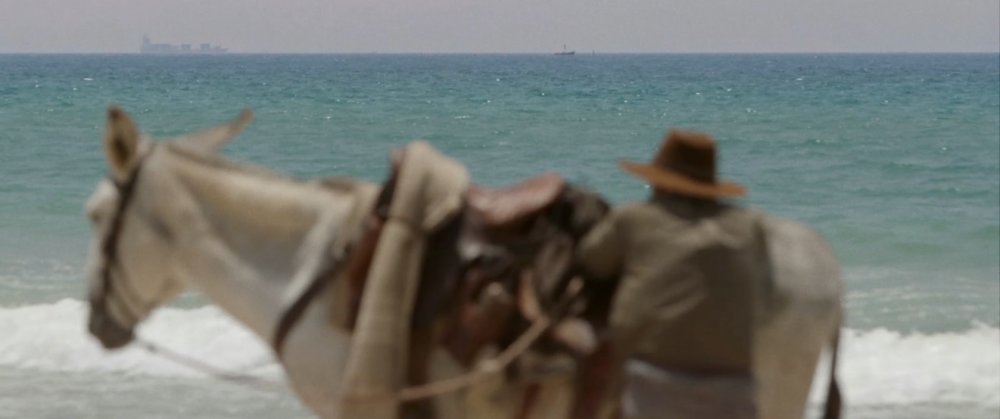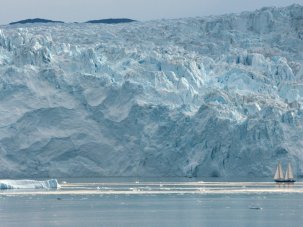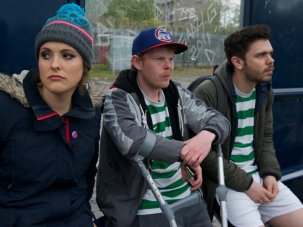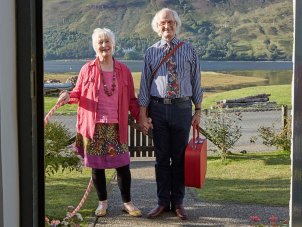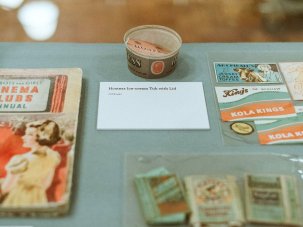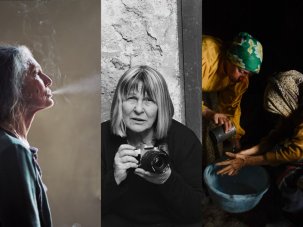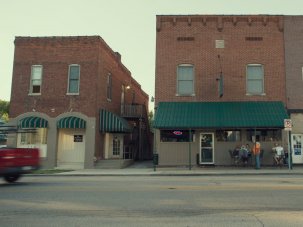Scotland has made continual attempts to bolster its screen industries in recent years, with the country’s public arts body Creative Scotland offering multimillion-pound lures to film and television productions to base themselves in Scotland, additional funds for broadcast content, the establishment of a £20 million screen unit (Screen Scotland) to support fledging film production and a push to build a long-discussed full-scale Scottish film studio. These efforts show a serious commitment towards feature film and television production within the nation, so far realised in a rise in film production spend from £23 million in 2007 to £95 million in 2017.
Aquarela is in UK cinemas from 13 December 2019.
I Am Breathing is available on DVD.
Becoming Animal is available to watch on dafilms.com.
Freedom Fields is playing select global cinema screenings.
Nae Pasaran is available on DVD.
Donkeyote is available to download.
Time Trial is available to download.
These financial announcements arrive alongside the usual rhetoric: spiel about attracting international investment to the country, creating a Scottish home for the screen industries, or putting Scotland on the map.
But sitting parallel to this runs another story. Scotland already has a thriving filmmaking industry, one that has been getting on with it without much bluster. Look to Scotland’s documentary output, and an industry with an already international mentality can be observed: films that have international subject matter, feature international talent and are reaching international audiences – and indeed, are also attracting international investment. A number of production companies and independent filmmakers – starting from the nexus that is the Scottish Documentary Institute (SDI), the country’s creative nonfiction hub – are producing artful, intelligent nonfiction feature films and shorts, work that displays an ambition and outlook beyond the confines of the country of their origin.
Established in 2004 by Noé Mendelle and Sonja Henrici, the SDI “specialises in documentary training, production and distribution” and has a focus that grows year by year. Speaking by phone last year, Henrici notes that the organisation’s remit was international from the offset. “There was never any doubt. It’s a necessity to have an international tribe, and if you want to make this work, you need to be connected to the rest of the world to survive.”
Based at the Edinburgh College of Art, the organisation is led by working filmmakers – a small cohort of producers and directors including Mendelle and Henrici, Emma Davie (director, I Am Breathing, Becoming Animal), Flore Cosquer (producer, Freedom Fields), Rebecca Day (associate producer, Nae Pasaran) and Finlay Pretsell (director, Time Trial) – something that feeds into the projects they support.
“We are always experiencing ourselves what it is like to pitch and to finance, which I think gives a sort of authenticity to what we are talking about,” says Henrici. “It also keeps us abreast of developments. We need to know what’s happening because we also want to finance films; and because of what we’ve done and our international links, we have grown a unique international network.”
This can be seen in their initiatives, too. Bridging the Gap – the SDI’s first project and the one that “remains [their] flagship programme” – aims to help Scottish documentarians to develop ten-minute shorts, providing £8,000 alongside production and distribution support. Many of the shorts produced have been international festival successes.
Callum Rice’s Mining Poems or Odes short for the 2019 edition of the SDI’s Bridging the Gap programme
Their early-feature support also displayed their border-crossing intentions, seen in an early scheme called Interdoc which taught producers about international financing and supported travel to international markets. “With that we were trying to make it easier for people to learn about the international scene, and connect them with it, whilst also growing the ambition for documentary and what it could mean.”
A third prong, the Edinburgh Pitch, has ran alongside the Edinburgh International Film Festival for 12 years, and also serves to increase the international links in the Scottish documentary scene. “It is small, still, but it brings decision-makers to Scotland, and also allows observers to learn what is going on and try their own ideas out.”
Will Anderson’s Big Dunc Loves Pitching trailer for the 2015 Edinburgh Pitch
The most unique endeavour, though, may be the SDI workshops that are operated abroad in partnership with the British Council, residential labs that have so far facilitated filmmaking in Pakistan, Bangladesh, Morocco, Libya, Syria, Jordan, Palestine and Vietnam. As well as offering under-supported filmmakers the tools and skills they need, they also allow individuals in these regions to be “connected internationally to the creative documentary scene, to be inspired but also to be able to tell their own stories”.
This is perhaps the clearest expression of the trenchant internationalism that is present in Scottish documentary: not just creating ties through established industry or festival routes, but establishing new pathways to areas with less access – something that holds obvious benefits for both the recipient and deliverer of the outreach being offered.
Syrian Stories trailer
The result of these efforts, and those of Scotland’s other documentary organisations, has recently become more apparent. “In a showreel we did at last year’s Sheffield Doc/Fest we had 22 features in various stages of completion and development. A few years ago, it was five or ten: there’s been a real shift,” says Henrici.
Completed features too are surfacing on increasingly more notable stages. Finlay Pretsell’s Time Trial (2017) premiered in IDFA’s feature-length competition in late 2017. Felipe Bustos Sierra’s Nae Pasaran (2018) – a film that began as a Bridging the Gap short in 2013 and was the first ever UK-Chilean co-production – closed Glasgow Film Festival in March last year; when Emma Davie and Peter Mettler’s Becoming Animal (2018) also competed for CPH:DOX’s main DOX:Award, having been pitched at that festival the year before.
Becoming Animal trailer
Viktor Kossakovsky’s Aquarela (2018), produced by the Glasgow based Aconite Productions, premiered at Venice Film Festival 2018, whilst Freedom Fields (2018) – the debut feature of Naziha Arebi, a participant in SDI’s Libya workshop and contributor to the Libya in Motion (2017) omnibus feature – started its life at the Toronto International Film Festival just after, screening regularly since. Most recently, Scottish-Swedish co-production Scheme Birds (2019), a hybrid documentary set in a Motherwell estate directed by two Swedish filmmakers, Ellen Fiske and Ellinor Hallin, won the Best Documentary award at Tribeca earlier this year.
This initial strive for internationalism, then, has seemingly produced results. Nearly all of these films are international co-productions or have international directors involved. “It’s a natural progression. It widens your audience as well,” Henrici describes the trend. “People are getting smart about it. They may have a Scottish story, but we can try to make it a genuine coproduction. It’s smart, but also really helpful for your film.”
A clip from Aquarela
Aimara Reques, Aconite’s CEO and one of Aquarela’s producers – a former Interdoc participant herself – is similarly pragmatic. “Scotland is very small as a nation and when I saw lots of people competing with each other for a small pot of money, I started to travel to every single market.”
Ties made through early projects started relationships that resulted in funding for Aquarela, a project that was, as she says, “initiated in Scotland” but in its scope, subject and the people involved grew far wider in the five years following – being picked up for sales by Lionsgate International on its premiere at Venice, then being acquired by Sony Pictures Classics in various territories.
The films have been good too – creative, clever documentaries of a type that the country has always reached towards, as can be seen in earlier SDI projects like Emma Davie’s I Am Breathing (2012) or Chico Pereira’s Donkeyote (2017). The immersive, invigorating Time Trial has an inventiveness about it, strapping cameras onto every part of David Millar’s bicycle to capture his craft captivatingly, representing the experience more directly than most sports documentaries achieve.
Time Trial cinema trailer
Likewise, Aquarela is a very visceral, arresting experience. A rush of big, bold, high-fidelity sounds and images, every shot and cut in the film works to demonstrate the raw, insurmountable power of water in all its worldly forms: captured as it is in rushing tides, collapsing icecaps, crashing waves and blistering storms.
Becoming Animal is a particular gem, an inquisitive and intelligent look into the complex interactions between man, nature and technology, arbitrated by a uniquely compelling presence in cultural ecologist and philosopher David Abrams and presented in a visual mode that is genuinely experimental and engrossing.
Becoming Animal trailer
Speaking of this increasing internationalism of Scottish documentary filmmaking, Becoming Animal’s co-director Emma Davie notes that it is not just about financing but inspiration too. “I think the drive for internationalism has always been creative more than financial.” In her case this has materialised in the form of collaboration with Swiss-Canadian filmmaker Peter Mettler; a partnership between Scottish (SDI) and Swiss co-producers (Maximage), and in an American setting (Grand Teton National Park) and principal subject (David Abrams), resulting in a film that traverses cultures, countries, and even species too.
“Over the years we have looked more to Europe and the rest of the world than to the UK for influences. This was mainly because we felt we needed to learn and grow from widely different traditions which challenged and pushed documentary form,” Davie adds, a point with which Freedom Fields producer Flore Cosquer concurs. “For me it’s about developing complex and powerful stories which will resonate with audiences in your country but also outside. Being challenged by other ways of looking at documentary making, and offered different angles to a story. And of course it’s about the community and the support that comes with it.”
Freedom Fields trailer
This community is important, as while Scottish documentaries may not necessarily be about Scottish subjects, or be made by filmmakers who are Scottish by birth (Henrici was born in Germany, Conquer is French, Reques hails from Venezuela, and many of the various film’s directors were not born in Scotland either), the country is proud of its culture’s increasingly prodigious output, and its governmental funding body is (relatively) generous towards documentary.
“Screen Scotland is proud to support Scottish documentary filmmakers and the wide-range of high quality films that are currently being made here. It’s great that they are making such an impact on Scottish, UK and international audiences,” says Leslie Finlay, the Screen Officer at Creative Scotland who deals most with documentaries, staying well within company lines but perhaps revealing an enthusiasm that is at the heart of what he and his agency does.
“It is really great to have an ally,” says Henrici, adding more broadly that “in documentary we are fortunate that everyone is very committed to making the best films, in whatever way they are involved in them – whether they are funders or execs, or producers.” Achieving this – considering the lack of resources and respect that nonfiction film often receives – takes a large amount of passion and persistence, and seemingly some degree of international cooperation too.
Nae Pasaran trailer
“I think it is important that we think globally and not just locally. When you bring various talents together you can achieve great things,” Reques argues, and in this regard Scotland is leading a charge, but also bearing the brunt of a broader struggle. Henrici summarises that “when trying to fund films like [those that the SDI makes], or be an organisation that promotes artistic documentaries, people don’t really understand it. It’s a small sector or art form, but I’m very hopeful that people will start to understand the power of it. The success of Scottish documentaries might make that point to future funders.”
Looking just at the quality of the nonfiction films made in Scotland over the last few years, and the outsized successes these films have had, documentary viewers and makers across the UK and beyond may hope so too.
Donkeyote trailer
-
The Greatest Documentaries of All Time poll
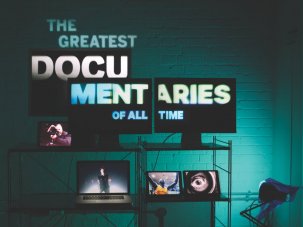
What are the greatest documentaries ever made? We polled 340 critics, programmers and filmmakers in the search for authoritative answers.
-
The Digital Edition and Archive quick link
Log in here to your digital edition and archive subscription, take a look at the packages on offer and buy a subscription.




